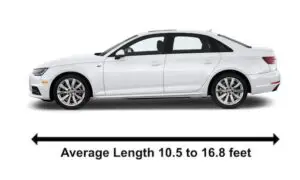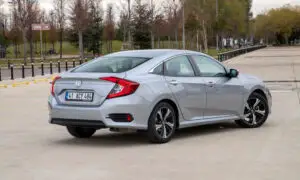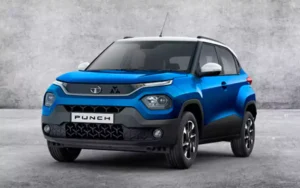Get ready to rev up your engines as we explore the fascinating world of automobile measurements. From compact city cars to towering SUVs, we’ll delve into what makes a car the perfect fit for your lifestyle and answer all your burning questions on car length feet. So, buckle up, and let’s hit the road.
Car length is a measurement that indicates the total length of a vehicle from its front bumper to its rear bumper. It is usually measured in feet or meters and is an important factor in determining a car’s size and maneuverability.
It affects factors such as parking, storage, and driving comfort. A car’s length is one of the key aspects to consider when purchasing a vehicle, as it directly impacts its usability and overall performance.
What is the average length of a car in feet?

Are you in the market for a new car but want to make sure it fits comfortably in your garage and is easy to maneuver on the roads? The average length of a car in feet is an important factor to consider.
Typically, the average length of a passenger car ranges from about 14 to 16 feet. However, this can vary greatly depending on the type of vehicle. For example, compact cars tend to be around 14-15 feet, while full-sized sedans and SUVs can be upwards of 17-19 feet.
It’s important to note that car length is just one aspect to consider when choosing the right vehicle for your needs. Other factors such as height, width, and turning radius also play a role in a car’s overall size and driving experience.
So, before you make your next purchase, make sure to take car length into consideration and find the perfect fit for you and your lifestyle.
How long is a compact car in feet?
If you’re in the market for a new car and are looking for something that’s easy to park, maneuver in tight spaces, and great on gas, a compact car might be right up your alley.
Well, the average length of a compact car is around 14 to 15 feet. This makes them ideal for city driving and easy to park in tight spots, like small garages or parallel parking on crowded streets.
It’s important to keep in mind that while compact cars are generally shorter in length, they can still vary in size. So, make sure to check the specific measurements of the model you’re interested in before making a purchase.
How long is a mid-sized car in feet?
When it comes to choosing the right car for your needs, size matters, and if you’re in the market for something that strikes the perfect balance between compactness and comfort, a mid-sized car might just be what you’re looking for.
Well, the average length of a mid-sized car is around 16 to 17 feet. This makes them larger than compact cars, providing more interior space and a more comfortable ride for passengers. They’re also typically easier to handle on the road than larger vehicles like SUVs, making them a popular choice for families and those who want a car that’s easy to drive.
It’s important to keep in mind that while the average length of a mid-sized car is around 16 to 17 feet, there can still be variations in size. So, make sure to check the specific measurements of the model you’re interested in before making a purchase.
How long is a full-sized car in feet?
A full-sized car typically measures around 16 to 18 feet in length. This measurement can vary slightly between different models and makes of cars, but the average length of a full-sized car is around 17 feet.
This is a relatively standard size for many four-door sedans, wagons, and SUVs, making it a popular choice for families and individuals who want a roomy and comfortable vehicle.
How long is a sports car in feet?
A sports car is generally smaller in size compared to a full-sized car and typically measures around 14 to 16 feet in length. The exact length of a sports car can vary greatly depending on the make, model, and style of the car. Some sports cars, such as a Porsche 911, may measure around 14 feet in length, while others, such as a Chevrolet Corvette, can be up to 16 feet in length.
The length of a sports car is often designed to be compact and aerodynamic, allowing for better handling and higher speeds on the road. Despite their smaller size, sports cars can still offer a comfortable and stylish ride for two people, with features such as racing-style seats and advanced technological systems.
It’s important to keep in mind that the length of a sports car can affect its parking and maneuverability, as well as its overall performance on the road. When shopping for a sports car, it’s a good idea to consider the length of the vehicle and how it will fit your driving needs.
How long is an SUV in feet?
Sport Utility Vehicles (SUVs) can range in length from around 14 to 19 feet. The exact length of an SUV will depend on the make, model, and style of the vehicle.
Compact SUVs, such as a Honda CR-V or Toyota RAV4, generally measure around 14 to 16 feet in length. Mid-sized SUVs, like a Ford Edge or Nissan Murano, are typically around 16 to 17 feet long. Large SUVs, such as a Chevrolet Tahoe or Ford Expedition, can be up to 19 feet in length or more.
SUVs offer more interior space and cargo room compared to smaller vehicles, making them a popular choice for families and individuals who need more room for passengers and belongings. The length of an SUV can also affect its overall performance on the road, including its handling, fuel efficiency, and towing capacity.
It’s important to consider the length of an SUV when making a purchase, as a longer vehicle may be more challenging to park in tight spaces or navigate through narrow roads. On the other hand, a longer SUV can offer more space and comfort for passengers and additional storage room for cargo.
How long is a pickup truck in feet?

Pickup trucks can range in length from around 15 to 22 feet, depending on the make, model, and style of the vehicle.
Compact pickup trucks, such as a Toyota Tacoma or Nissan Frontier, typically measure around 15 to 16 feet in length. Full-sized pickup trucks, like a Ford F-150 or Chevrolet Silverado, are generally around 19 to 20 feet in length. Heavy-duty pickup trucks, such as a Ford Super Duty or Chevrolet HD, can be even longer, measuring up to 22 feet or more.
The length of a pickup truck can affect its overall performance and capabilities, including its payload capacity, towing capacity, and maneuverability. A longer pickup truck may be able to haul more cargo and tow heavier loads, but it may also be more challenging to park and navigate through tight spaces.
When shopping for a pickup truck, it’s important to consider the length of the vehicle and how it will fit your specific needs. A compact pickup truck may be more maneuverable, while a full-sized or heavy-duty pickup truck may offer more cargo and towing capacity.
How long is a minivan in feet?
Minivans typically measure around 16 to 17 feet in length, although the exact length can vary slightly between different models and makes of minivans.
Minivans are designed to provide ample interior space for passengers and cargo, with features such as sliding doors, flexible seating arrangements, and ample storage compartments. The length of a minivan can affect its overall passenger and cargo capacity, as well as its handling and fuel efficiency.
Despite their larger size, minivans are often more maneuverable and easier to park than full-sized vans or SUVs due to their compact design and precise handling. This makes them a popular choice for families and individuals who need a roomy and versatile vehicle for daily driving and road trips.
It’s important to consider the length of a minivan when making a purchase, as a longer minivan may offer more space for passengers and cargo but may also be more challenging to park in tight spaces or navigate through narrow roads.
What is the longest car in feet currently available on the market?
As of my knowledge cutoff in 2021, the longest car currently available on the market is the Rolls-Royce Phantom, which measures around 21.5 feet in length. This luxurious car is one of the largest and most prestigious vehicles available, offering a spacious and elegant interior along with advanced technology and safety features.
The Phantom is part of the ultra-luxury car market and is often used as a chauffeured limousine or a personal vehicle for the wealthy. Its lengthy size provides ample space for passengers, with a spacious cabin and plush seating, as well as additional storage compartments.
It’s important to note that while the Rolls-Royce Phantom is currently one of the longest cars available, the exact length of a vehicle can vary based on the make, model, and style. There are other cars on the market that come close in length to the Phantom, such as the Maybach S-Class, which measures around 21 feet.
It’s essential to consider the length of a vehicle when making a purchase, as a long car may offer more space and comfort but may also be more challenging to park and navigate on the road.
How do the lengths of different car models compare?
The length of a car can vary greatly between different models, with cars ranging from subcompact models that measure around 10 to 12 feet in length to full-sized luxury vehicles that measure over 20 feet. Here’s a comparison of the typical lengths of different types of car models:
- Subcompact Cars: These are the smallest and most fuel-efficient type of cars, with lengths ranging from 10 to 12 feet. Examples include the Honda Fit and the Toyota Yaris.
- Compact Cars: Compact cars are slightly larger than subcompacts, with lengths ranging from 13 to 14 feet. Examples include the Toyota Corolla and the Honda Civic.
- Midsized Cars: Midsized cars offer more space and comfort than compact cars, with lengths ranging from 15 to 16 feet. Examples include the Toyota Camry and the Honda Accord.
- Full-sized Cars: Full-sized cars are the largest type of passenger car, with lengths ranging from 17 to 19 feet. Examples include the Toyota Avalon and the Chevrolet Impala.
- SUVs: Sport Utility Vehicles can range in length from around 14 to 19 feet, with compact SUVs like the Honda CR-V and Toyota RAV4 measuring around 14 to 16 feet, mid-sized SUVs like the Ford Edge and Nissan Murano measuring around 16 to 17 feet, and large SUVs like the Chevrolet Tahoe and Ford Expedition measuring up to 19 feet or more.
- Pickup Trucks: Pickup trucks can range in length from around 15 to 22 feet, with compact pickup trucks like the Toyota Tacoma and Nissan Frontier measuring around 15 to 16 feet, full-sized pickup trucks like the Ford F-150 and Chevrolet Silverado measuring around 19 to 20 feet, and heavy-duty pickup trucks like the Ford Super Duty and Chevrolet HD measuring up to 22 feet or more.
How long is an electric car in feet?
The length of an electric car can vary greatly, depending on the make, model, and style. Electric cars come in a variety of shapes and sizes, from small city cars to large family vehicles.
For example, the popular electric hatchback, the Tesla Model 3, measures around 14.5 feet in length. On the other hand, the electric SUV, the Tesla Model X, measures around 16.5 feet in length.
It’s important to note that the length of an electric car can vary based on the specific model and style, just like with conventional gas-powered cars. Some electric cars may be shorter in length than their gas-powered counterparts, while others may be slightly longer due to their battery packs and other electric components.
When choosing an electric car, it’s essential to consider the length, as well as other factors such as range, charging time, and performance, to ensure that the vehicle meets your needs and expectations.
Recommended:
- How much does a 5 gallon bucket of paint weigh?
- How many cups is 32 oz?
- Largest luggage size for check-in
How do car lengths affect parking and maneuverability?

The length of a car can greatly impact its parking and maneuverability, with longer cars often being more challenging to park and maneuver in tight spaces.
Longer cars generally require more space to park and can be difficult to maneuver in tight spots, such as narrow parking spaces or crowded city streets. In addition, longer cars may have a larger turning radius, making it more difficult to make tight turns or navigate narrow roads.
On the other hand, shorter cars, such as subcompacts or compact cars, are generally easier to park and maneuver in tight spaces. They have a smaller turning radius, which makes it easier to make tight turns, and they require less space to park.
It’s important to consider the length of a car when making a purchase, especially if you’ll be using the car in an urban setting or if you need to park in tight spots regularly.
If maneuverability and ease of parking are important factors for you, you may want to consider a smaller car, such as a subcompact or compact car. On the other hand, if you need a larger car for additional space and comfort, a longer car, such as a full-sized car or an SUV, maybe a better choice.
Conclusion
The length of a car can greatly impact its parking and maneuverability. Longer cars, such as full-sized cars or SUVs, may be more challenging to park and maneuver in tight spaces, while shorter cars, such as subcompacts or compacts, are generally easier to park and navigate in urban areas.
When choosing a car, it’s important to consider the car length feet, as well as other factors such as performance, range, and charging time, to ensure that the vehicle meets your needs and expectations.


